Ever thought about refinancing your car loan to save money? It’s a strategy where you get a new loan to pay off your old one, often with better terms. This can help lower your monthly payments or change how long you pay off your loan.
In Canada, you can refinance through banks, credit unions, or online lenders. Each has its own benefits. Understanding this process is key for those wanting to improve their finances.
Learning about car loan refinancing helps you make smart choices. Things like your credit score, interest rates, and how much your car is worth play a big role. It’s important to think about each of these carefully.
Understanding Car Loan Refinancing
Car loan refinancing means swapping an old auto loan for a new one with different terms. This could include a lower interest rate, changed monthly payments, or a new loan length. It’s important for borrowers to understand this process well.
Several factors affect this choice. These include the loan balance left, current market rates, and the borrower’s credit score. Knowing these helps in making the right decision.
A lower refinancing rate can greatly reduce what you pay each month. This makes it attractive to many Canadian drivers wanting to improve their finances. Understanding refinancing helps in making smart choices about auto loans and budgeting.
Benefits of Refinancing a Car Loan
Refinancing a car loan can save you money on payments. Lower interest rates mean smaller monthly payments. This can be a big help if you’re struggling to pay your loan.
Refinancing also offers other benefits. You can combine different debts into one, switch to a fixed rate, or change your loan term. These changes can make managing your finances easier.
Another perk is getting cash from your car’s equity. You can use this for home improvements or paying off other debts. So, refinancing isn’t just about saving money now. It also helps improve your financial health in the long run.
The Refinancing Process in Canada
The refinancing process in Canada starts with checking your current car loan. This step helps figure out if refinancing is a good idea. You’ll need to gather important financial documents like income statements and your current loan details. Also, make sure you have your credit report ready.
With all your documents in hand, a refinancing calculator can show you potential savings. This tool helps you compare different lenders and their offers. It’s a great way to see which option might save you the most money.
After picking the best option, you’ll apply for the new loan. This application checks your credit score. If approved, the new loan will pay off your old one. Then, you’ll start making payments under the new terms. Knowing each step of this process is key to making smart financial decisions.
Key Considerations Before Refinancing
Before you decide to refinance, think about a few key things. First, compare the current interest rates with your loan rates. Even small differences can save a lot over time. Also, know about any fees for refinancing, as they can affect your savings.
Think about how long you’ll keep the vehicle. If it’s a short time, the upfront costs might outweigh the savings. Calculating the break-even point helps you see when the savings will be more than the costs.
Choosing a lender with a good reputation and competitive offers is crucial. Looking for the best refinance deals in Canada can help you get good terms and rates. Doing a thorough financial evaluation will help you make the right choice for your refinancing.
Potential Downsides of Refinancing
Refinancing a car loan can seem appealing, but there are risks. You might face extra costs like prepayment penalties or refinancing fees. These can eat into any savings you hope to get from lower payments.
Choosing to extend your loan term might seem like a good idea. It could make your monthly payments smaller. But, you’ll likely end up paying more interest over time. This can affect your finances in the long run.
It’s also important to think about your credit score. If it’s lower than when you first got the loan, you might not get better interest rates. Knowing these risks helps you make better choices.
Frequently Asked Questions about Car Loan Refinancing
Many borrowers have questions about car loan refinancing. One big question is how often you can refinance. You can refinance as often as you like, but it’s best to do so when interest rates go down or your financial situation changes a lot. This can lead to lower monthly payments and save you money in the long run.
Another question is how refinancing affects your credit score. Applying for a new loan can temporarily lower your score due to multiple inquiries. But, the long-term savings from refinancing often make up for this. Knowing this can help you make better financial choices.
Also, the documents needed for refinancing are important. Lenders want to see proof of income, ID, and details about your current loan and car. By understanding these needs, borrowers can make the refinancing process easier. This leads to a smoother transition and better financial outcomes.





